Iran buys surface-to-surface missiles capable of hitting Europe
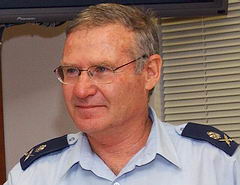
Israel Defense Forces Intelligence Branch, Major General Amos Yadlin
Iran has purchased surface-to-surface missiles from North Korea with a range of 2,500 kilometers, the head of the Israel Defense Forces Intelligence Branch, Major General Amos Yadlin, said Wednesday.
While Iran already possessed missiles capable of reaching Israel, the new weapons pose a threat for countries in Europe and parts of the Middle East that have now come into Iranian range.
Some of the missiles have already arrived in Iran, Yadlin said in a lecture in memory of Israel’s sixth president Haim Herzog, who was also head of the IDF Intelligence Branch. The missiles are known in the West as BM-25s, operate on liquid fuel and are single-stage. The BM-25 was originally manufactured in the Soviet Union, where the first generation, adapted for use by Soviet submarines and able to carry a nuclear warhead, was known as the SSN6. After the Russians retired the missiles from service, they sold them to the North Koreans, who developed them to carry a heavier payload.
With this purchase the Iranians have leap-frogged over their Shihab-4 missile with its range of 2,000 kilometers.
Iran worked for years on the development of the Shihab-3, which has a range of 1,300 kilometers, and conducted numerous tests. They also developed a cone with improved ability to enter the atmosphere, which meant it was more accurate.
The fact that the Shihab-3, when fired from certain areas of Iran, could hit Israel, spurred Israel on in its development of the Arrow missile, which can intercept the Shihab-3.
The Iranians are known to be at the early stages of developing two more long-range missiles. However American intelligence sources say Iran is at an advanced stage of developing a missile that can carry a nuclear warhead.
The United States has informed the International Atomic Energy Agency (IAEA) of the details of the Iranian missile program.
North Korea has longer range missiles that have been tested a number of times outside its borders. In one case a missile flew over Japanese airspace during a test.
 Wild Thing’s comment……
Wild Thing’s comment……
I say start dropping Bibles and Christian tracts on Iran 24 hours a day and broadcast “What A Friend We Have In Jesus” on every commercial radio frequency used within Iran.
I can imagine the reaction of those diaperheaded mullahs.
Iran Threatens To Strike At U.S. Targets If Attacked

Iran’s Supreme Leader Ayatollah Ali Khamenei speaks to workers in Tehran April 26, 2006. REUTERS/IRNA
TEHRAN (Reuters) – Iran vowed on Wednesday to strike at U.S. interests worldwide if it is attacked by the United States, which is keeping military options open in case diplomacy fails to curb Tehran’s nuclear program.
Supreme Leader Ayatollah Ali Khamenei made the threat two days before the U.N. nuclear watchdog reports on whether Iran is meeting Security Council demands to halt uranium enrichment.
Iran says it will not stop enrichment, which it says is purely for civilian purposes and not part of what the United States says is a clandestine effort to make atomic bombs.
“The Americans should know that if they assault Iran their interests will be harmed anywhere in the world that is possible,” Khamenei was quoted as saying by state television.
“The Iranian nation will respond to any blow with double the intensity,” he said.
Washington, backed by Britain and France, has been pushing for sanctions if, as it expects, the International Atomic Energy Agency (IAEA) reports that Iran has flouted U.N. demands.
But Russia and China, the U.N. Security Council’s other two veto-holding permanent members, oppose any embargo.
The IAEA has said that after three years of investigation it still cannot confirm that Iran’s aims are entirely peaceful, although it has found no hard proof of a military program.
Complete article
200 Burka Babes Take On Fitness Gym

(Photo by David P. Gilkey/Associated Press)
Angry: Arrwa Mogalli (left) and Ammerah Saidi, both of Dearborn, stand in front of the Fitness USA gym in Lincoln Park.
LINCOLN PARK, Mich. —
About 200 Muslim women have asked the Fitness USA workout chain to honor what they say was its promise to provide separate exercise times for women and men. They say they need single-sex workout times to accommodate Islam’s standards of modesty.
Arrwa Mogalli, 28, of Dearborn, Michigan, said that she agreed to buy a $1,465 lifetime membership with the chain after being promised that its Lincoln Park facility would be open only to women on certain days.
This month, the gym in this southern Detroit suburb decided to open up a new part of the center to both sexes every day.
Mogalli is among about 200 women with Fitness USA memberships who have signed a petition asking the chain to restore single-sex exercise days for the entire gym or to put up a divider so men and women cannot see each other while exercising.
The company is reviewing the women’s concerns, said Jodi Berry, administrative director for Fitness USA. But the company said that the women’s written contracts say nothing about gender.
And this is their main site.
 Wild Thing’s comment….
Wild Thing’s comment….
Sure CAIR praised the decision, they are terrorists huggers.
I guess to be literal it does say they have seperated areas. But by gosh oh golly I guess I just will never understand this get undressed in the closet mentality no matter what so called religion it is.
Why are we accomodating these idiots? Just more Moooooooslim appeasement… instead of having them assimilating to western society our country kisses their burka butts.
I belong to Gold’s gym, but aren’t there workout places around like Curves etc. that are just for women only.
Don’t the veils, towels on their heads and masks get in the way of exercising? If they don’t like the facilities why don’t they open their own bloody gym and run it any way they like?
Prices, location, management, the gym’s design, the gym’s equipment, hours, etc., etc., all may change without notice. This is how capitalism has always worked. They need to go back home where their way of doing things has perpetually kept them locked up in the 7th Century.
Incrementalism.
Give him an inch and he wants a foot.
Give him an foot and he wants a yard.
Give him a yard and he wants a pool in it.
Muslim Student Union in Calif. ~ Enemy Within
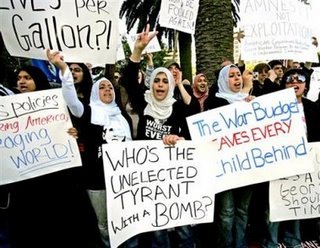
Women from the Muslim Student Union at University of California at Irvine protest the President and the Iraqi war at the Hyatt hotel in Irvine, Calif., where President George W. Bush spoke to Orange County business leaders on Monday, April 24, 2006. (AP Photo/Branimir Kvartuc)
.
2004 the Muslim Student Union (MSU) of University of California-Irvine asked graduating Muslim students to wear green sashes bearing the word “shahada,” the Arabic word for “martyrdom.” The Muslim world refers to a suicide bomber who kills innocent civilians in Israel as a “shahid.”
USC Muslim Student Union Slips Into Open Anti-Semitism
Not-so-subtle anti-Semitic jokes are a little too tame for USC’s Muslim Student Union listserv. In response to some USC Jewish groups’ Holocaust memorials. of the MSU’s listserv have posted some of the following charming contributions. This is just one of them. All misspellings and grammatical cleverness is in the originals.
holocust schmolocost…..
that whole thing drives me nuts.
there arent that many holicost surviviers.
most of those guys havent experienced anything — except possibly excess.
its a tool the zionists use… but to be honest wonder how effective it is these days
The Muslim Student Union is, of course, a university-sanctioned organization whose elected representatives represent USC Muslims to the University and to the community. How could such an environment emerge? On UC Irvine’s campus, the administration has told campus Jewish leaders that they are not to refer to themselves as Zionists because that will “undermine dialogue” with Muslims on campus.
Boogeyman Ahmadinejad Says Nope Nada Neaner Neaner

.
NOTE: look at feet in photo!
.
Ahmadinejad: Iran will not back down “an iota” on nukes
Tehran, Iran, Apr. 26 –Iran’s hard-line President Mahmoud Ahmadinejad said on Wednesday that the Islamic Republic would not back down “an iota” in its nuclear standoff with the West.
“Regarding the Iranian nation’s nuclear rights we are not willing to back down an iota”, Ahmadinejad told reporters at a joint press conference with Sudanese President Omar Hassan al-Bashir.
“The [International Atomic Energy] Agency was obliged under the Non-Proliferation Treaty to respect our nuclear rights and assist our country in obtaining peaceful technology”, he said, adding that the UN nuclear agency had “failed” to live up to its obligations.
He warned the West that Tehran would ignore “incorrect decisions” being imposed on it by the IAEA and the United Nations Security Council.
“An unjust decision by the international community on Iran’s nuclear program has no legitimacy for Iran even if it comes through the Security Council or other international organisations”, the hard-line President said.
The West was carrying out a psychological war against Iran to gain concessions, he added.
In March, the Security Council adopted a “Presidential Statement” unanimously giving Iran until April 28 to suspend all of its uranium enrichment activities and resume its cooperation with the UN nuclear watchdog.
Greenpeace Ads to Target Ted Kennedy ~ LOL
.
The infamous environmental group Greenpeace is targeting Sen. Ted Kennedy for opposing a wind farm in the Nantucket Sound because it would interfere with the view from his Hyannisport mansion.
Greenpeace is launching a nationwide TV ad campaign against Kennedy, with spots that portray the Massachusetts Democrat as Godzilla.
The Cape Cod Times reports:“In the 30-second spot, a cartoon Kennedy looms over the water like a Japanese movie monster, pounding wind turbines as they sprout from the water, and barks, ‘I might see them from my mansion on the Cape.'”
Kennedy’s nephew, Robert F. Kennedy, Jr. is a leading environmentalist who urges Americans to cut back on energy consumption and who blamed Bush environmental policies for Hurricane Katrina. But he, too, opposes the wind farm in Nantucket Sound – going so far as to argue that it would cause pollution.
By running the ads, Greenpeace hopes to torpedo an amendment to a Coast Guard bill that would make a proposed Nantucket wind farm vulnerable to state veto.“‘We’ve targeted the Senate because we need leaders to stop this amendment before it can even be voted,” Greenpeace spokesgal Kate Smolski told the Times.
.

 Wild Thing’s comment…..
Wild Thing’s comment…..There once was a Senator from Nantucket.
who drank gin by the bucket………….
Kennedy is a huge enviro jerk and he only cares about stopping this because it is to be in his own backyard. If it was in Joe Schmo’s backyard Kennedy would be pushing hard for this.
Kerry Said Our Troops Don’t Know How To Drive
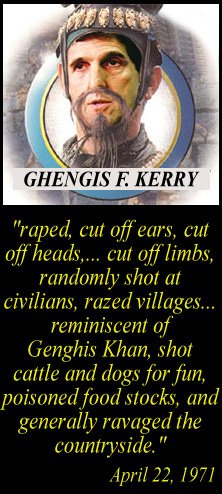
.
Kerry went from praising CIA traitor Mary McCarthy, to calling US soldiers idiots for getting blown up by IED’s. Kerry believes the deaths in Iraq are caused by the US Soldiers inability to “drive a truck.”
But there is no excuse three and a half years later for American troops to be driving by IEDs and getting blown up. Are you telling me that they can’t drive a truck?
John Kerry Said: Our Troops Don’t Know How To Drive (VIDEO)
In the Vietnam era, he testified against US soldiers and called them war criminals. Today, he calls them terrorists who brutalize women and children in the night. These are the things he’s brazen enough to say in public.
 Wild Thing’s comment……
Wild Thing’s comment……
Yadda Yadda Kerry! Talk to the hand you piece of shit!
Holocaust Day of Remembrance
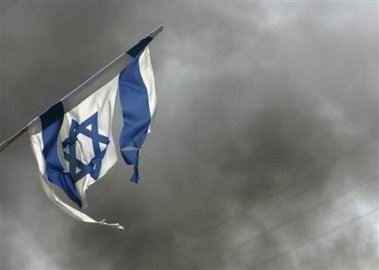
April 25, 2006, is a day of remembrance for six million Jews who perished during the Holocaust
.

.
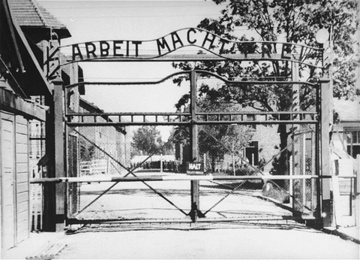
.
The United States Congress established the Days of Remembrance as our nation’s annual commemoration of the victims of the Holocaust, and created the United States Holocaust Memorial Museum as a permanent living memorial to those victims.
This year, the Days of Remembrance fall between Sunday, April 23, and Sunday, April 30, 2006, with Holocaust Remembrance Day observed on April 25. The theme for this year’s commemoration is “Legacies of Justice,” in honor of the courage of, and the precedents set by, those who testified during the trials of Nazi war criminals. The theme also pays tribute to those who tirelessly work for the cause of justice, both then and now.
Today, more than ever before, individual and communal willingness to seek justice after the Holocaust serves as a powerful example of how our nation can – and must – respond to unprecedented crimes. We must vigorously pursue justice for the victims of such acts of hatred and inhumanity, not only for their sake but for the sake of present and future generations.
The Holocaust was an unprecedented crime – millions of murders, wrongful imprisonments, and tortures, rape, theft, and destruction. In the immediate aftermath of the Holocaust, the world was faced with a challenge – how to seek justice for an almost unimaginable scale of criminal behavior. The International Military Tribunal (IMT) held at Nuremberg, Germany, attempted to meet this immense challenge on a legal basis. This year, we mark the 60th anniversary of the IMT.
Nazi Germany planned and implemented the Holocaust under the cover of World War II. It was in this context that the IMT was created, a trial of judgment for war crimes. The IMT was not a court convened to mete out punishment for the Holocaust alone. The tribunal was designed to document and redress crimes committed in the course of the most massive conflict the world has ever known.
The Holocaust was, in the legal language of the IMT, “a crime against humanity.” Convened within months of the end of the war, from November 20, 1945, until the verdicts were delivered on October 1, 1946, the tribunal at Nuremberg set precedents: in international law, in documentation of the historical record – in seeking some beginning, however inadequate, in a search for justice.
.
Wild Thing’s comment……
We must never forget what happened in those six years. We must not forget the six million who left us. However, I believe that we must also remember that despite his best efforts, Hitler was NOT able to annihilate the entire Jewish people. Though the numbers have been reduced, Israel is still a living, thriving nation.
There are troubling parallels between the systematic vilification of Jews before the Holocaust and the current vilification of the Jewish people and Israel. Suffice it to note the annual flood of anti-Israel resolutions at the UN; or the public opinion polls taken in Europe, which single out Israel as a danger to world peace; or the divestment campaigns being waged in the US against Israel; or the attempts to delegitimize Israel’s very existence.
The complicity of the Allies in WW II is mirrored by the support the PLO has been receiving from Europe, China and Russia to this very day.
If remembering Auschwitz should teach us anything, it is that we must all support Israel and the Jewish people
against the vilification and the complicity we are witnessing, knowing where it inevitably leads.
My Israel page at my website

* AbbaGav
* Perspectives of a Nomad
U.S. Air Force Reply To UC Santa Cruz Students Against War
On my other post about Santa Cruz I had commented back to someone that had commented about this subject as the person said my mentioning Veterans along with our troops today and the recruiters was not accurate. That what the protesters did was only directed at the recruiters.
My reply was:
“There is a Brotherhood of those that served and those that serve today and cannot be separated. It is a Brotherhood that ONLY those that have served can be a part of.
So when you see protest toward our military of today you damn well better know it is not selective at just those now…..”
The a Major in the U.S. Air Force also has something to say to UC Santa Cruz Students Against War, who organized the counter-recruiting protest and their attacks on Michelle Malkin.
.

.

In defense of Malkin vs. UC Santa Cruz
Before I manned the jet and flew yet another mission over Afghanistan (20.7hrs) I was able to write a few names on one of the 12 2000# face melting JDAM’s we carry. I’m sending this your way from a real e-mail address before I send it “their” way from a fake one. Something tells me they won’t like the picture.
 Wild Thing’s comment…..
Wild Thing’s comment…..
God Bless our troops! You guys ROCK!

* Anti-Idiotarian Rottweiler
* The Dread Pundit Bluto
Former CIA Officer Mary O. McCarthy Rescinding Her Confession
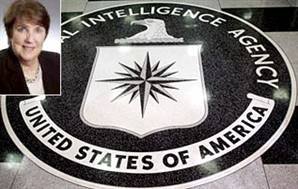
.
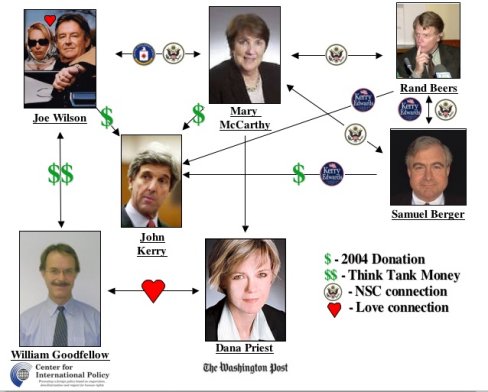
A former colleague says the fired Mary McCarthy ‘categorically denies’ being the source of the leak on agency renditions.
The fired official, Mary O. McCarthy, “categorically denies being the source of the leak,” one of McCarthy’s friends and former colleagues, Rand Beers, said Monday after speaking to McCarthy. Beers said he could not elaborate on this denial and McCarthy herself did not respond to a request for comment left by NEWSWEEK on her home answering machine.
A national security advisor to Democratic Party candidate John Kerry during the 2004 presidential campaign, Beers worked as the head of intelligence programs on President Bill Clinton’s National Security Council staff and later served as a top deputy on counter-terrorism for President Bush in 2002 and 2003. McCarthy, a career CIA analyst, initially worked as a deputy to Beers on the NSC and later took over Beer’s role as the Clinton NSC’s top intelligence expert.
 Wild Thing’s comment……
Wild Thing’s comment……
She confessed, now she denies? Hmmm… just another Democrat.


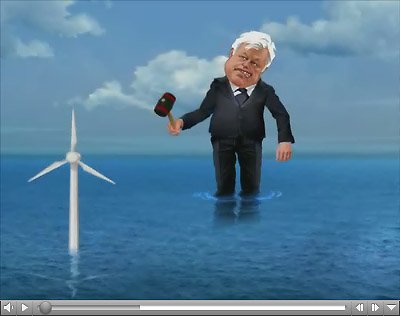
Recent Comments